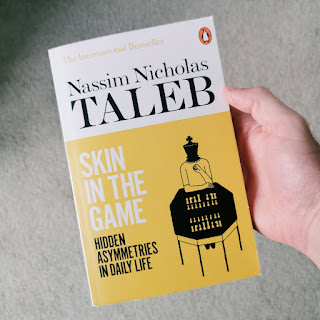In Skin In The Game, Nassim Nicholas Taleb explains how the willingness of accepting one’s own risks is an important quality of heroes, saints and successful people in all walks of life.
Skin In The Game is about the distortions of symmetry and reciprocity in life. If you have the rewards, you must also get some of the risks and not let others pay the price of your mistakes.
Here are my highlights from the book:
If you have the rewards, you must also get some of the risks, not let others pay the price of your mistakes. If you inflict risk on others, and they are harmed, you need to pay some price for it.
Don’t tell
me what you “think,” just tell me what’s in your portfolio.
The golden rule wants you to treat others the way you would like them to treat you.
Yogi Berra (dynamic
rule for symmetric relations): “I go to other people’s funerals so they come to
mine.”
Isocrates:
“Conduct yourself toward your parents as you would have your children conduct
themselves toward you.”
His more
practical approach is start by being nice to every person you meet. But if
someone tries to exercise power over you, exercise power over him.
I personally
know rich horrible forecasters and poor “good” forecasters. Because what
matters in life isn’t how frequently one is “right” about outcomes, but how
much one makes when one is right.
Those who
talk should do and only those who do should talk
Simply: if you can’t put your soul into something, give it up and leave that stuff to someone else.
Being alive means taking certain risks.
Laws come
and go; ethics stay.
Nietzsche
got the point: Sympathy for all would be tyranny for thee, my good neighbor.
A kosher (or
halal) eater will never eat nonkosher (or nonhalal) food, but a nonkosher eater
isn’t banned from eating kosher.
A disabled
person will not use the regular bathroom, but a nondisabled person will use the
bathroom for disabled people.


No comments:
Post a Comment